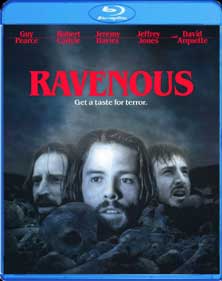 RAVENOUS
(1999) Blu-ray
RAVENOUS
(1999) Blu-rayDirector: Antonia Bird
Scream Factory/Shout! Factory
 RAVENOUS
(1999) Blu-ray
RAVENOUS
(1999) Blu-rayIn spite of the cowardice that resulted in the deaths of all of his fellow officers, John Boyd (Guy Pearce, the DON'T BE AFRAID OF THE DARK remake) is promoted to captain for single-handedly taking over an enemy command post during the Mexican American war and promptly transferred to California's Fort Spencer, a way station for westward travelers that doesn't see a lot of action during the long winters. He is third in command under the avuncular Colonel Hart (Jeffrey Jones, FERRIS BUELLER'S DAY OFF) and frequently inebriated doctor Major Knox (Stephen Spinella, RUBBER). The other banished misfits set to while away the long winter include aggressive Private Reich (Neal McDonough, MINORITY REPORT), fervent preacher Private Toffler (Jeremy Davies, SAVING PRIVATE RYAN), Peyote-smoking Private Cleaves (David Arquette, SCREAM), and Native American siblings George (Joseph Running Fox, PORKY'S II: THE NEXT DAY) and Martha (Sheila Tousey, LORD OF ILLUSIONS).
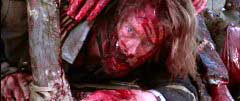
Suddenly, preacher F.W. Calhoun (Robert Carlyle, Antonia Bird's PRIEST) stumbles into the fort as the sole survivor of a wagon train led on a disastrous shortcut by arrogant guide Colonel Ives that soon became lost in the Rockies where they resorted to cannibalism. As their numbers (cameos by producers David Heyman and Tim Van Rellim) dwindled and their wanton hunger grew – a point which sticks with Boyd whose lone conquering of the Mexican command post was preceded by the inadvertent swallowing of the blood of his fallen men while buried amongst them – Calhoun knew he would be next and fled, leaving behind Ives and the party's only woman (cameo by Pearce's wife Kate). Hart resolves to take a party up to the mountains to rescue any survivors, despite George's warnings about the Wendigo, a man turned demon after consuming human flesh. Although scared and deeply ashamed of his part in the tragedy, Calhoun nevertheless leads the soldiers back to the cave; but it turns out to be a trap with Calhoun revealed to be the nefarious and cannibalistic Colonel Ives. Badly injured and left for dead with one of his compatriots, he succumbs to the hunger and makes his way back to camp; but is he returning to stop Colonel Ives or to find more prey?
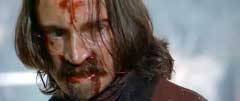 Establishing
from the first frame – well, the first black screen – that RAVENOUS
is not a serious horror film, but a blackly comic satire drawing parallels between
cannibalism and manifest destiny's consumption and ravaging of the land, it's
resources, and its people. More so than any other more straightforward films
referencing the Wendigo – or even Algernon Blackwood's creepy short story
– RAVENOUS gets at the heart of the myth, in which the consumption of
flesh is associated with greed, gluttony, and cowardice (or at least selfishness)
with Ives representing the worst of these and preying on the weaknesses of those
he feeds upon as well as those he wants to convert (there is no doubt in this
film as to cannibalism's healing properties). At the core of the film is Boyd's
moral dilemma, with whatever advantages in strength and perceived bravery (from
selfishly consuming others and thus taking a part of them into oneself) coming
with a price for those with a conscience. Pearce acquits himself well as the
straight man amidst the quirks of his supporting cast – Arquette manages
against all odds to largely reign himself in (or at least keep from distracting)
while Davies' affectations range from amusing to tiresome – and Carlyle's
amusing arch villainy while the Czech and Slovakian settings perhaps convince
as the Rockies (I didn't notice, but I haven't been to the Rockies). The memorably
off-kilter scoring of Michael Nyman (THE PIANO) and Blur's Damon Albarn (101
REYKJAVÍK) will alienate some while drawing others in to this singular
effort from the accomplished yet underrated Antonia Bird (FACE) who sadly passed
away last October.
Establishing
from the first frame – well, the first black screen – that RAVENOUS
is not a serious horror film, but a blackly comic satire drawing parallels between
cannibalism and manifest destiny's consumption and ravaging of the land, it's
resources, and its people. More so than any other more straightforward films
referencing the Wendigo – or even Algernon Blackwood's creepy short story
– RAVENOUS gets at the heart of the myth, in which the consumption of
flesh is associated with greed, gluttony, and cowardice (or at least selfishness)
with Ives representing the worst of these and preying on the weaknesses of those
he feeds upon as well as those he wants to convert (there is no doubt in this
film as to cannibalism's healing properties). At the core of the film is Boyd's
moral dilemma, with whatever advantages in strength and perceived bravery (from
selfishly consuming others and thus taking a part of them into oneself) coming
with a price for those with a conscience. Pearce acquits himself well as the
straight man amidst the quirks of his supporting cast – Arquette manages
against all odds to largely reign himself in (or at least keep from distracting)
while Davies' affectations range from amusing to tiresome – and Carlyle's
amusing arch villainy while the Czech and Slovakian settings perhaps convince
as the Rockies (I didn't notice, but I haven't been to the Rockies). The memorably
off-kilter scoring of Michael Nyman (THE PIANO) and Blur's Damon Albarn (101
REYKJAVÍK) will alienate some while drawing others in to this singular
effort from the accomplished yet underrated Antonia Bird (FACE) who sadly passed
away last October.
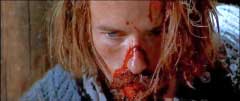
Early reviews of the disc's 1080p24 MPEG-4 AVC 2.35:1 transfer have been volatile, so I was expecting the transfer to look terrible; and it is, as far as what one would expect from a studio title only fifteen years old. Although mastered in HD from the original IP (which sports some black specs here and there starting with the opening Fox logo), it appears to have been done so several years ago as the image looks rather dull. Fox's only DVD release of the film was non-anamorphic, but the Blu-ray presentation at times reminds me of watching a 16:9 DVD on an HDTV, so it's technically an improvement (Netflix has a streaming version in HD but the Super 35 production has been opened up to 1.78:1, and it's pretty compressed). The transfer certainly did not distract from my enjoyment of the film itself, but the pedigree of the film – not to mention Anthony B. Richmond's (DON'T LOOK NOW) photography and the film's costumes and production design – deserves better. Audio options include DTS-HD Master Audio 5.1 - more atmospheric than directional in the surrounds - and 2.0 stereo tracks (perfectly adequate), as well as optional English subtitles.
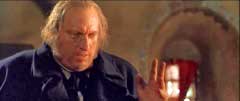 Carried
over from the DVD are three commentary tracks with: (1) director Antonia Bird
and composer Damon Albarn, (2) screenwriter Ted Griffin and actor Jeffrey Jones,
and (3) actor Robert Carlyle. Bird discusses coming onto the project that had
already been cast by someone else, and the bewildering decision to shoot the
interior scenes first (explaining why we see snowy painted backdrops through
the windows before there is any snow). She also recalls the hellish Durango,
Mexico scenes (120 degree heat, steaks that had to be cooked fresh in between
takes, and an extra having an epileptic fit), and the lack of expected snow
in Slovakia where the exteriors were shot (the studio scenes were in the Czech
Republic). She also discusses how Fox felt it was important to establish early
on that it was a satire and that it was okay to laugh, and that the zipping
titles were inspired by Sergio Leone's ONCE UPON A TIME IN THE WEST. One of
the reasons she decided to fragment the opening Mexican-American War battle
scene as flashbacks was because she didn't want the film to seem like it was
aping SAVING PRIVATE RYAN (especially with the presence of Davies). Albarn discusses
collaborating with Nyman, who introduced him to the Portsmouth Symphonia (an
experimental orchestra of non-musicians or musicians playing instruments that
were new to them), as well as approaching Running Fox to do the Native American
singing (the actor recommended him to Quilt Man to do the vocals). Of the Leone
angle, Albarn had already incorporated the Dulcimer into his scoring patterned
after Morricone's western work. They sometimes talk over one another, but they
have an amusing rapport revealing a deep investment in the project by both.
Bird unfortunately does not identify the cinematographer on the film before
Richmond.
Carried
over from the DVD are three commentary tracks with: (1) director Antonia Bird
and composer Damon Albarn, (2) screenwriter Ted Griffin and actor Jeffrey Jones,
and (3) actor Robert Carlyle. Bird discusses coming onto the project that had
already been cast by someone else, and the bewildering decision to shoot the
interior scenes first (explaining why we see snowy painted backdrops through
the windows before there is any snow). She also recalls the hellish Durango,
Mexico scenes (120 degree heat, steaks that had to be cooked fresh in between
takes, and an extra having an epileptic fit), and the lack of expected snow
in Slovakia where the exteriors were shot (the studio scenes were in the Czech
Republic). She also discusses how Fox felt it was important to establish early
on that it was a satire and that it was okay to laugh, and that the zipping
titles were inspired by Sergio Leone's ONCE UPON A TIME IN THE WEST. One of
the reasons she decided to fragment the opening Mexican-American War battle
scene as flashbacks was because she didn't want the film to seem like it was
aping SAVING PRIVATE RYAN (especially with the presence of Davies). Albarn discusses
collaborating with Nyman, who introduced him to the Portsmouth Symphonia (an
experimental orchestra of non-musicians or musicians playing instruments that
were new to them), as well as approaching Running Fox to do the Native American
singing (the actor recommended him to Quilt Man to do the vocals). Of the Leone
angle, Albarn had already incorporated the Dulcimer into his scoring patterned
after Morricone's western work. They sometimes talk over one another, but they
have an amusing rapport revealing a deep investment in the project by both.
Bird unfortunately does not identify the cinematographer on the film before
Richmond.
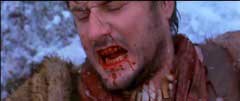
Griffin talks writing the script on spec in 1994 – partially inspired by a passage from THE THIN MAN – and the difficulty of selling "a period piece about cannibalism with now love story", some of the script's oral and visual food puns, as well as how the restructuring of the opening and the weather issues effected the intended contrast from the extreme heat and dust of the Mexico scenes to the cold and snowy of Fort Spencer and the Rockies (the muting of the color in post as well as the dullness of the old transfer also make this less apparent). Jones discusses working with Milcho Manchevski – whose BEFORE THE RAINS was Oscar-nominated for Best Foreign Film and the winner of several international festival awards – and then Bird, as well as his fellow cast members (a more concise version of his comments can be found in the newer interview discussed below). He also recalls his previous working experience in Prague on AMADEUS, shot at Barandov Studios as was this film. On Carlyle's track, he does not begin speaking until nearly fourteen minutes in with his first appearance (before that, we get the film soundtrack in Dolby Digital 2.0 stereo), and he rarely talks outside of his own scenes. It's possible that the track was meant to be a selected scenes commentary or that his comments were meant to be edited into a track with comments from another participant (possibly Pearce who is not present anywhere in the new or old supplements). As skilled an actor as he is, he does not have much to say in the way of profound statements. He makes some jokes and provides some shooting anecdotes (including comments on some deleted bits); however, he does discuss the importance of making his Calhoun character believable to the other men as well as his improvisation during scenes that read flat (like his spooked behavior when the men come across the cave). He also recalls vegetarian Pearce's difficulty with the stew scene and their improvised take on the ending.
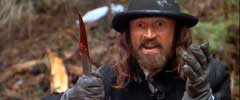 Also
carried over from the DVD release are a selection of deleted scenes (12:05),
a theatrical trailer (1:59), a TV spot (0:31), as well as costume/production
design still gallery. Bird provides optional commentary on the scenes, most
of which were cut for time – one hundred minutes specifically –
or because she felt the performances embodied their backstories so scenes in
which they elaborated on them were not necessary as were some bits of improvisation
(even though she liked the performances). One scene in which Knox cuts himself
shaving was cut because they forgot to shoot a close-up of Boyd's reaction to
the sight of blood, while a scene in which Reich takes a tumble down a snowbank
while holding onto Calhoun's reins was cut because the blocking and the stunt
looked poor while she felt the sight of an accurately-sized human femur looked
comical.
Also
carried over from the DVD release are a selection of deleted scenes (12:05),
a theatrical trailer (1:59), a TV spot (0:31), as well as costume/production
design still gallery. Bird provides optional commentary on the scenes, most
of which were cut for time – one hundred minutes specifically –
or because she felt the performances embodied their backstories so scenes in
which they elaborated on them were not necessary as were some bits of improvisation
(even though she liked the performances). One scene in which Knox cuts himself
shaving was cut because they forgot to shoot a close-up of Boyd's reaction to
the sight of blood, while a scene in which Reich takes a tumble down a snowbank
while holding onto Calhoun's reins was cut because the blocking and the stunt
looked poor while she felt the sight of an accurately-sized human femur looked
comical.
The only new extras are an isolated music and effects track (in DTS-HD Master Audio 2.0 stereo) and an interview with actor Jeffrey Jones (20:41) in which he expounds upon the multiple meanings of the title. He reveals that Antonia Bird was considered for the project before the producers went with Milcho Manchevski. Two weeks in, the producers were dissatisfied with the footage and fired Manchevski (who apparently was hired for a number of studio projects based on the prestige of his first film). The director they had in mind to replace him wanted to turn the film into a "cannibal comedy" (SOUTH PARK's Trey Parker and Troma already beat them to that with CANNIBAL! THE MUSICAL), and Jones tells us it was Carlyle who pressed for Bird – who had already prepared for the project the first time around – with whom he had worked on PRIEST and FACE, rallying the entire cast in favor of her or walking off the project altogether. He discusses the unseasonably warm winter in Slovakia, the use of pillow stuffing for snow until a storm finally came along in April, and Bird and screenwriter Ted Griffin (OCEAN'S ELEVEN) allowing him to change the arc of his character. (Eric Cotenas)